The top accolade in Singapore’s nursing profession, the President’s Award for Nurses honours nurses who have made excellent contributions to the profession and community. Six nurses were presented with the Award this year, bringing the total number of recipients since the inception of the Award to 67.
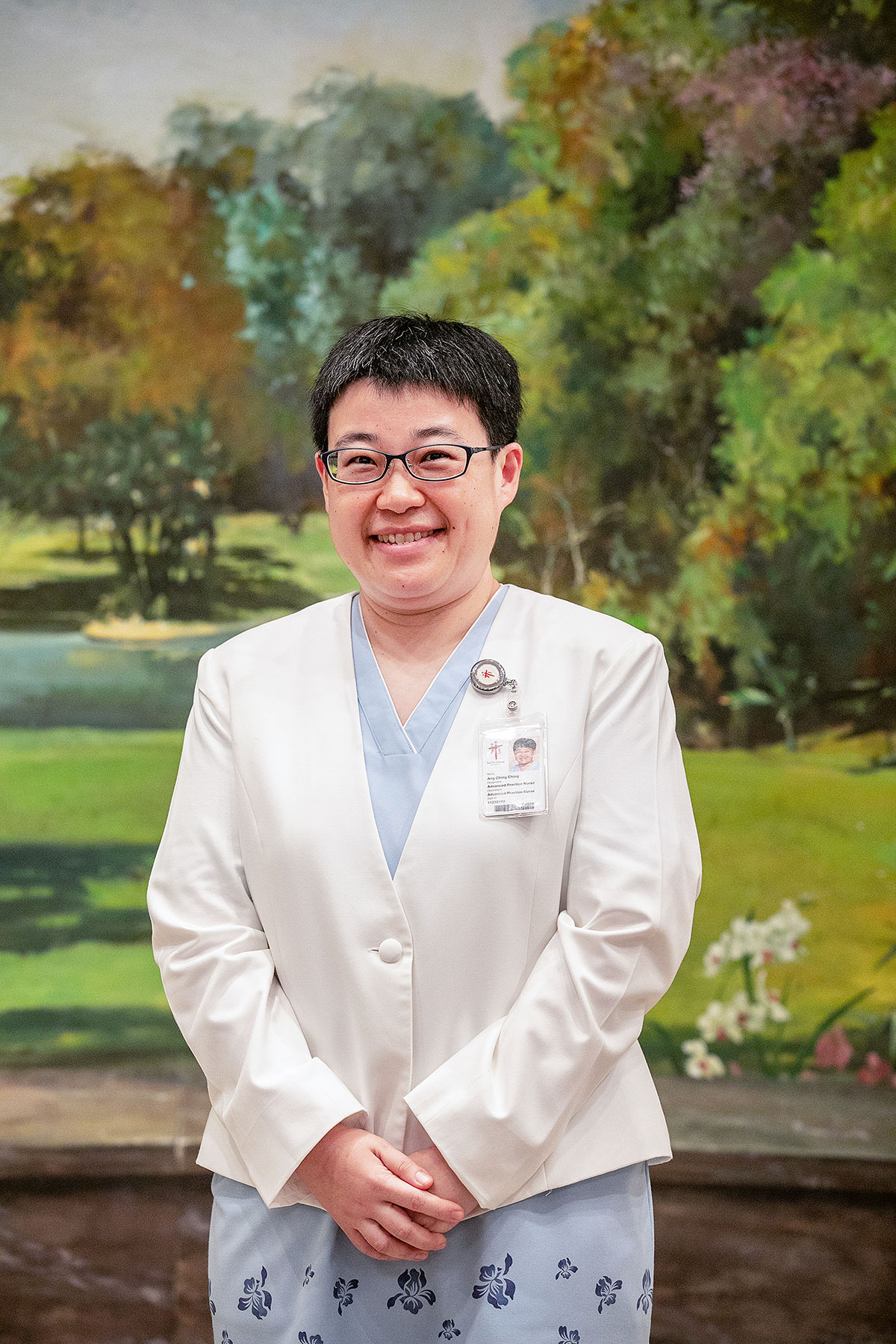
Ms Ang Ching Ching, Advanced Practice Nurse & Senior Nurse Clinician, Tan Tock Seng Hospital (TTSH)
Q: How did you feel when you found out you had won the President’s Award?
A: I am very honoured and grateful to have received the award. It is a wonderful achievement in my nursing career.
Q: What differences did you make in nursing?
A: I am blessed with the opportunity to work with esteemed colleagues from the TTSH Palliative Care team. They are supportive, nurturing and inspiring. We always work as a team, doing our best to take care of patients and their families with palliative care needs. The most significant difference we make in the hospital is the ability to provide the best possible care to patients and families, focusing on their quality of life and end-of-life wishes.
Q: Are there any nursing activities you’re involved in outside of work?
A: I am currently involved in a healthcare training programme – a collaboration between the Singapore International Foundation and TTSH – to teach palliative care in Kunming, Yunnan, China. We are heading to Kunming in November 2018 to kick-start the three-year training programme.
Q: Describe the nursing profession in one sentence.
A: Nursing is an amazing profession that brings out the greatest and most powerful human nature of every nurse – to touch the lives of others.
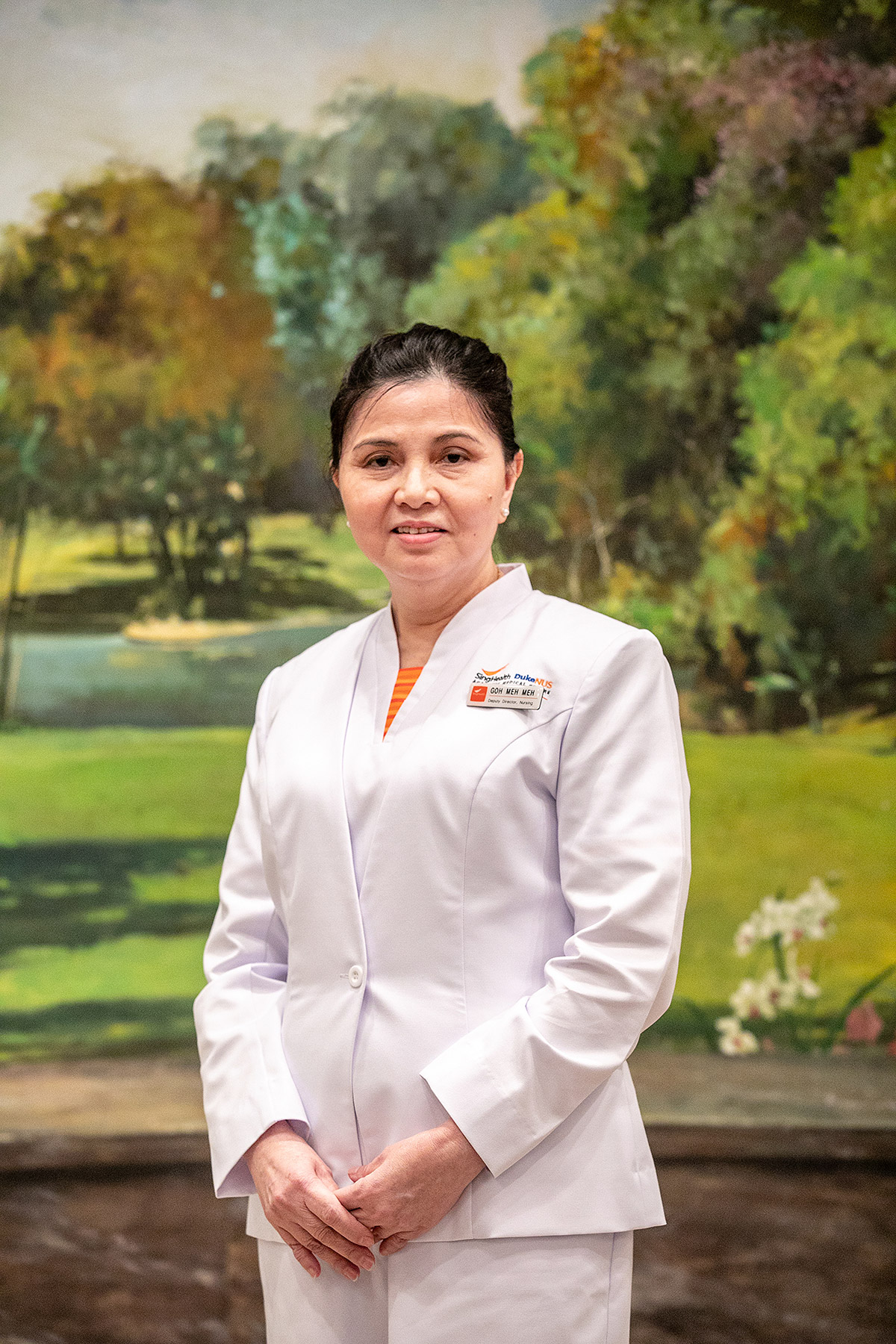
Ms Goh Meh Meh, Deputy Director of Nursing, Singapore General Hospital (SGH)
Q: How did you feel when you found out you had won the President’s Award?
A: I have always admired the recipients of the President’s Award; to me, they are superheroes who have made significant contributions to nursing. When I learnt about the news, I shed tears of
immense joy and felt a great sense of fulfillment. I am proud to achieve this award for SGH, the place
where I began my nursing career.
Q: What differences did you make in nursing?
A: I am trained as a perioperative nurse, which is more commonly known as an Operating Theatre
(OT) nurse. As part of a multi-disciplinary team, OT nurses work and collaborate with other
healthcare professionals in pre/intra/post-operative patient care. We are our patients’ advocates,
ensuring they are given only the best care and experience during their stay in the operating theatre.
As an OT nurse leader, I have transformed the OT services in SGH – integrating the work processes
and optimising staff training of the Major OTs, specialised OTs, the Ambulatory Surgery Centre with
short stay ward facilities and the Theatre Sterile Supplies Unit. I am also responsible for processes
planning, as well as the monitoring and management of OT performance to ensure effective
allocation of resources for maximum utilisation.
I will continue to attract, develop and retain the best nurses for OT. I hope to be a good role model
and help them grow, just like what my mentors did for me. I wish to build a sustainable and well-
trained OT Nursing Workforce to advance the quality of patient care and services.
Q: Are there any nursing activities you’re involved in outside of work?
A: Since 1992, I have been participating in humanitarian medical missions in countries such as China,
Myanmar and Mongolia and assisting in cleft lip and palate surgeries. Seeing the smiles of the
children who have had their cleft deformities repaired is incredibly rewarding. With my OT nursing
expertise, I am able to adapt and make use of resources on hand to ensure that all surgeries and
care are carried out smoothly.
I have also been active in our local community since 2000. I am the vice chairperson of Ci Yuan CC
Women’s Executive Committee. My healthcare knowledge comes in handy when we have to arrange
fitness classes, health screening and annual mammograms. Seeing the happy faces of residents are
highlights that add purpose in my life.
Q: Describe the nursing profession in one sentence.
A: Nursing is a calling; it requires one to be passionate in caring and empowering patients with
confidence to take charge of their own health.
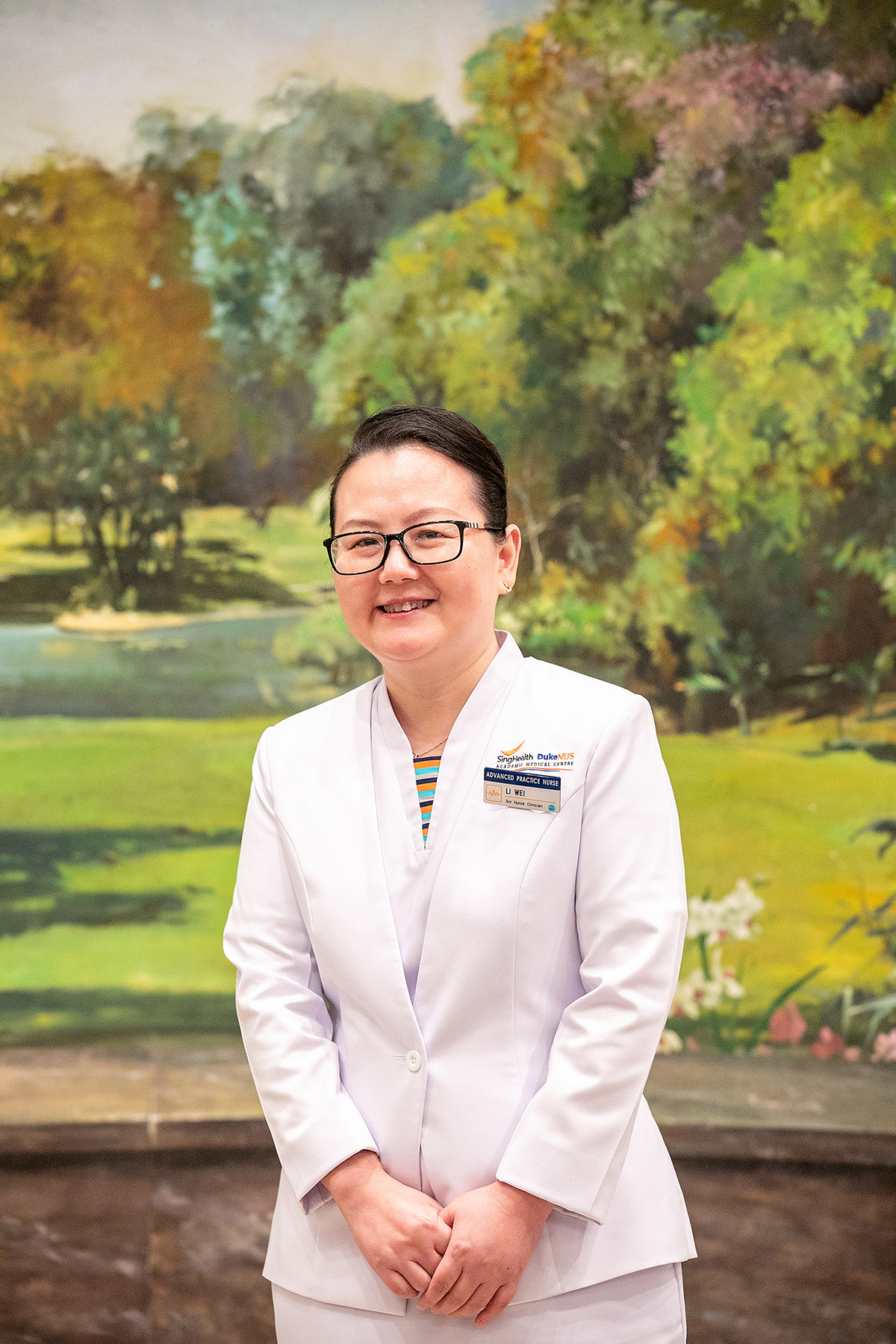
Ms Li Wei, Advanced Practice Nurse (APN) & Senior Nurse Clinician, National Neuroscience Institute
(NNI)
Q: How did you feel when you found out you had won the President’s Award?
A: I was elated! This honour is not mine alone – it goes to SingHealth, NNI, the nurses, staff and
partners in the Parkinson Disease and Movement Disorders programme. It is an affirmation of what
we have achieved together. I am grateful to everyone who have guided and helped me along the
way.
Q: What differences did you make in nursing?
A: I specialise in the care of Parkinson’s disease and movement disorders. In my area of
practice, I was the first APN in NNI who was given the opportunity to run a clinic and monitor
patients’ progress to reduce readmissions to the hospital.
I partner with clinicians to deliver coordinated care for patients who have undergone Deep Brain
Stimulation, a procedure that helps Parkinson’s disease patients manage their condition. I am trained
to perform DBS programming, which is usually managed by a neurologist. By charting the patients’
DBS journey from assessment to post-operative care, I am actively contributing to, and improving
their lives.
My passion to improve patients’ lives has also led to key projects to optimise care for Parkinson’s disease patients. For example, I helped to develop the Home Care Training and Support Programme
to equip home care nurses with the knowledge and skills to provide proper care to patients who are
immobile or with poor social support. Many patients and community healthcare partners have
benefited from this initiative.
As a specialist in Parkinson’s disease and movement disorders, I act as a resource person and collaborate with other institutions to
harmonise Parkinson Disease care. As the lead for educational conferences, together with fellow
practitioners, we actively contribute to the exchange of knowledge and clinical expertise, ultimately
enhancing care for our patients.
In addition, I enjoy mentoring budding nurses and overseeing the growth of APNs, where I monitor
the progress of APN interns and prepare them for the National Objective Structured Clinical
Examination to become a full-fledged APN.
Q: Are there any nursing activities you’re involved in outside of work?
A: I am also an active volunteer with the Parkinson Society Singapore (PSS) and serve as a board
member. In addition, I oversee the planning and execution of the Parkinson Disease caregiver
workshop.
Q: Describe the nursing profession in one sentence.
A: The journey of nursing is an art, to be appreciated, preserved and remembered through the
voyage of time.
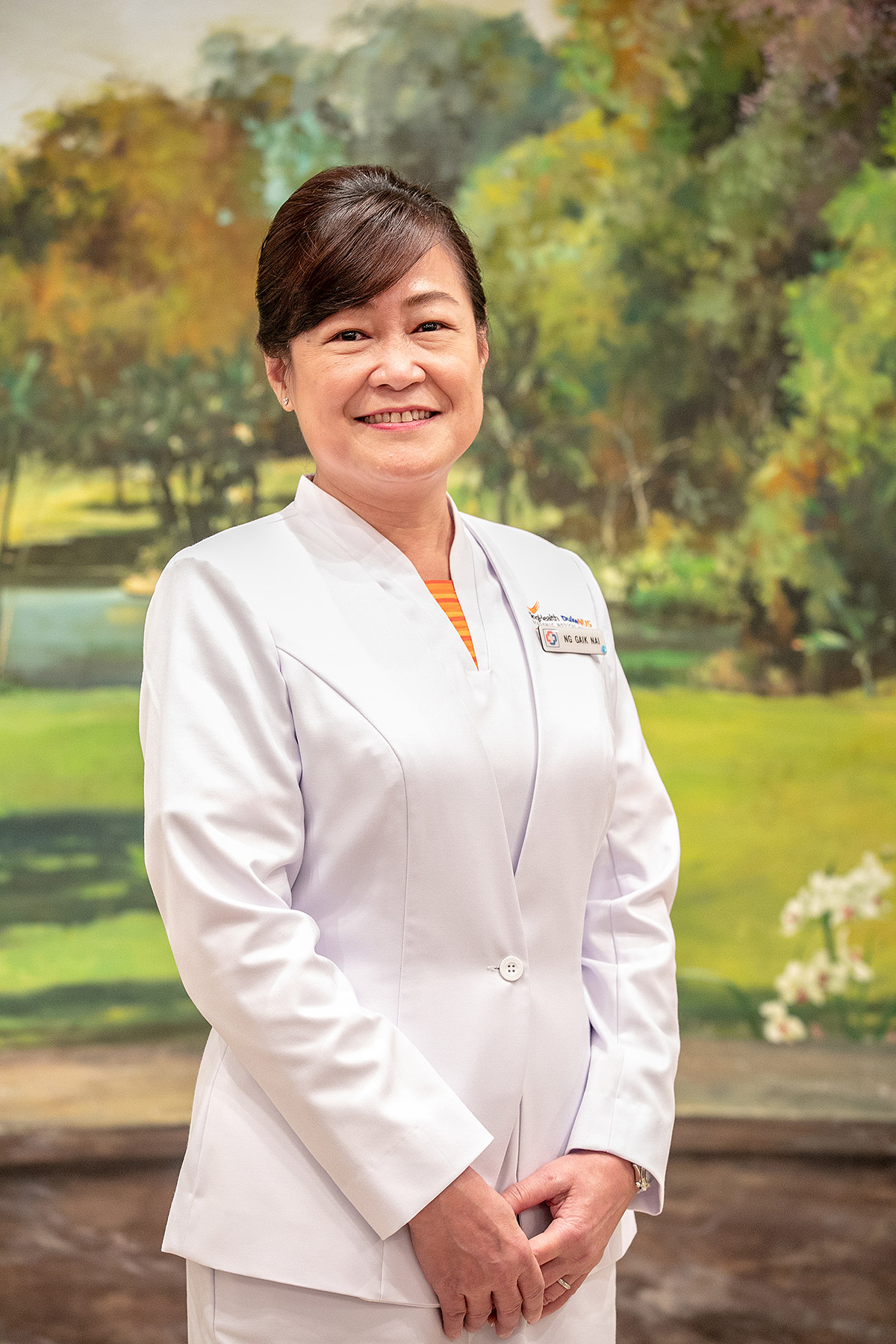
Ms Ng Gaik Nai, Chief Nurse, KK Women’s and Children’s Hospital and Deputy Group Chief Nurse,
Singhealth Services
Q: How did you feel when you found out you had won the President’s Award?
A: I am deeply honoured to receive the award. I am very thankful to those who nominated me and
supported my nomination. I would like to share this significant and joyful moment with my family
and colleagues, for without their continuous support and encouragement, this would not have been
possible. This award also serves as a reminder for me to continuously progress, to serve and do
better than I have done today!
Q: What differences did you make in nursing?
A: Taking on a leadership role enables me to guide our nurses to deliver the best care to our
patients. Our patients come to us with full trust and we must provide the care that is as good as the
care that we or our loved ones would like to receive.
I worked with my team to extend nursing care to the community by working with a multidisciplinary
team to establish a paediatric ward in a community hospital, and facilitated training for the
community nurses to provide specialised nursing care to babies and children with chronic illnesses
and special needs. Such long-term care services for paediatric patients were previously not available.
I believe that people are our greatest asset and we need to provide opportunities and develop them
to their fullest potential, so that they can be better leaders than us. We worked to expand the roles
of nurses by developing training programmes, i.e. Resident Training Programme and Advanced
Clinical Education Immersion Programme to upskill the registered nurses to perform comprehensive
assessment of the patients through history taking and initiate treatment and procedures.
Furthermore, we also deployed technology to advance nursing practice and improve patient care
processes, and established a dedicated Nursing Informatics unit to integrate IT into clinical practice
and introduced radio-frequency identification tagging in the obstetric wards.
Q: Are there any nursing activities you’re involved in outside of work?
As Chair, College of Clinical Nursing, SingHealth, I am responsible for leading and shaping the clinical
education landscape for nurses in SingHealth and beyond.
I am also the Chair of Singapore Nursing Association - Nursing Informatics Chapter, that aims to build
capacity and capability of IT competency amongst Singapore nurses. The Chapter is represented by
nurses from the three clusters and nursing schools and is currently embarking on research study on
nursing IT competency at the national level.
Q: Describe the nursing profession in one sentence.
Nurses need to use our heads, hearts and hands to constantly care for the sick, and to lead in clinical
nursing practices and work with a multidisciplinary team to drive transformational change for better
health outcomes for our patients.
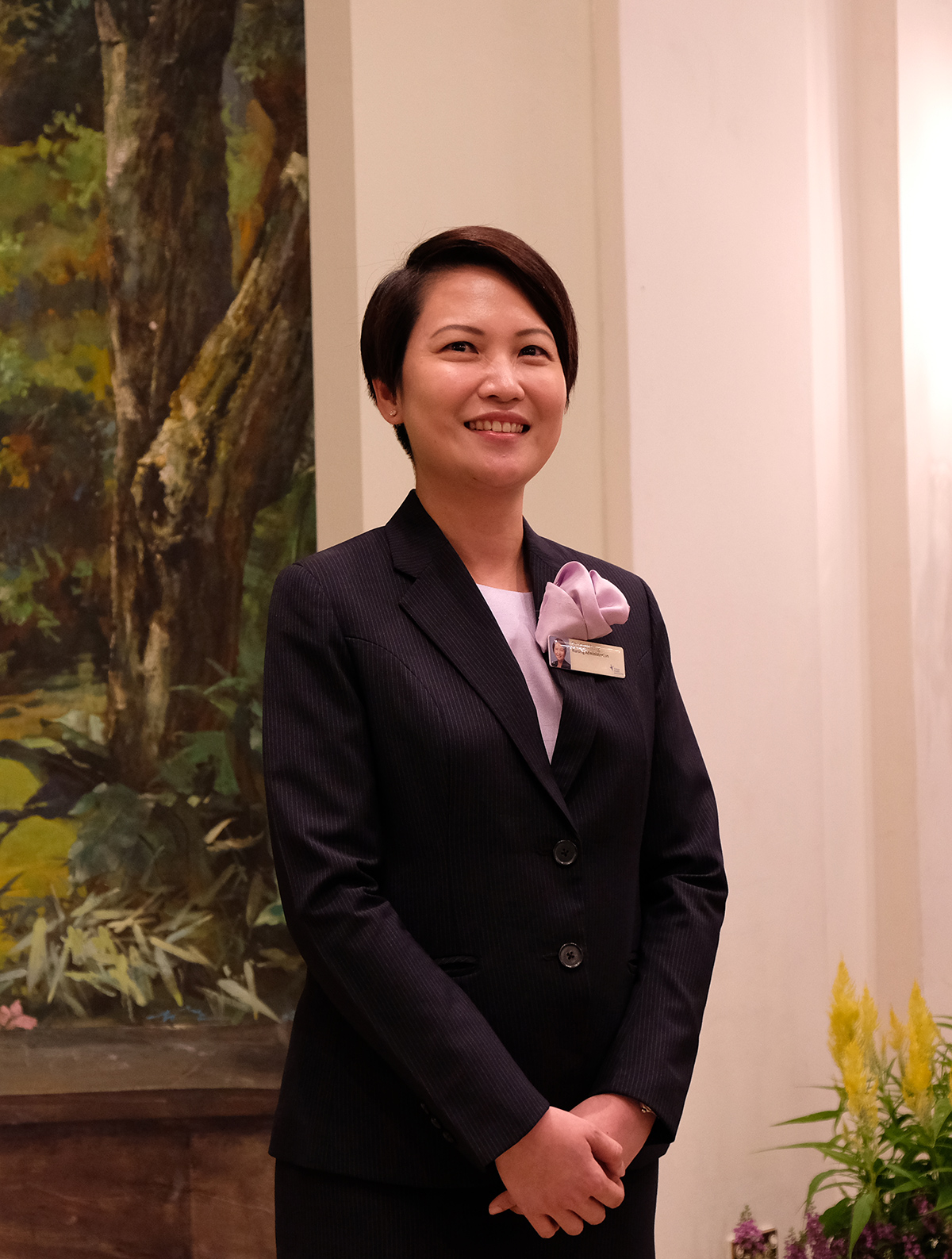
Ms Shirley Heng, Deputy Chief Nurse, Khoo Teck Puat Hospital
Q: How did you feel when you found out you had won the President’s Award?
A: The news came as a surprise. The selection interview was rather tough and I felt that I had not
sufficiently articulated my deep passion for nursing. I am deeply honoured and grateful for the
recognition, and it was an affirmation that I have been able to lead and inspire others.
Q: What differences did you make in nursing?
A: Throughout my career, I have been very involved in the improvement of care processes. This
includes the redesigning of manual and electronic care-related workflows which impacts the care
that nurses and other healthcare professionals deliver to patients or their families. As a clinical nurse
at the bedside for a number of years, I have had first-hand experiences in contributing to the direct
care of patients and I believe that care processes are critical in ensuring that nurses work in a better
environment. This enables them to work meaningfully with a sense of progress.
Q: Are there any nursing activities you’re involved in outside of work?
A: I mentor students and a network of individuals towards a possible career in healthcare. I am also
connected with nurses who have left healthcare and provide them with career counselling in the
hopes that they will be able to make informed decisions and possibly contribute back to healthcare
in some way or another.
Q: Describe the nursing profession in one sentence.
A: The nursing profession provides vast opportunities for learning and growth, applying compassion,
skills and critical decision-making, as well as making a difference in the lives of others every day.
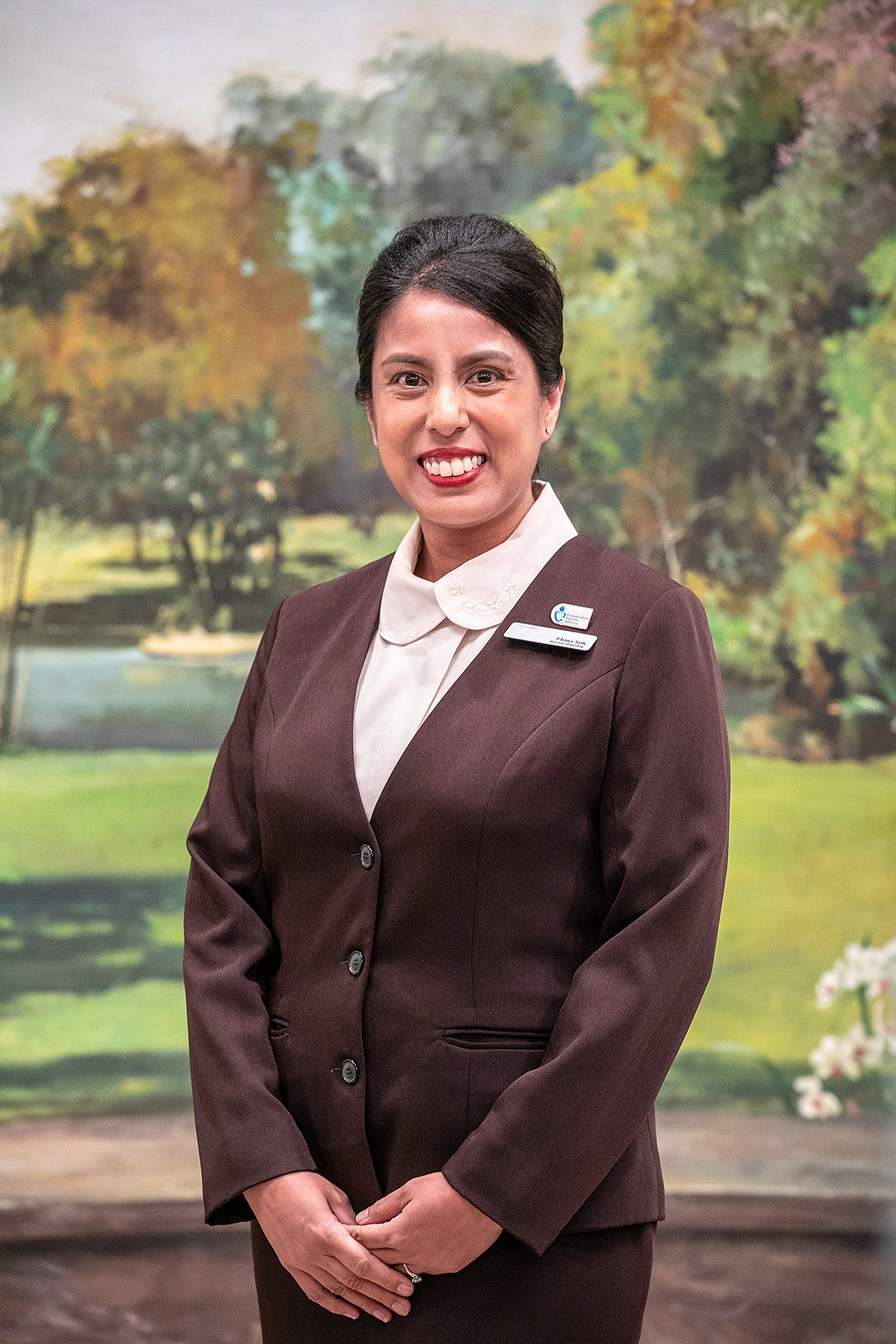
Ms Soh Poh Choo Mona, Director of Nursing, Gleneagles Hospital
Q: How did you feel when you found out you had won the President’s Award?
A: I am very proud and honoured to be the first recipient of this award from the private sector. It
came as a pleasant surprise. The win is not just an individual award but a strong affirmation of the
skills and dedication of all private sector nurses. It is a big booster and further encourages me to
contribute to the nursing profession.
Q: What differences did you make in nursing?
A: As a nursing leader in a hospital, I have significant influence and a wide range of responsibilities.
This includes caring for the well-being of staff, aiding the progression of our nurses by charting their
career path and aspirations, and motivating our nurses. This is to constantly uphold our
professionalism and improve the image of nursing.
I like adopting a multi-pronged approach in nursing strategies. With the strong support of top
management, I am empowered to evaluate nursing practices and given the autonomy to safeguard
and boost patient care. This includes realising the Parkway Pantai Nursing Philosophy:
Professionalism, Expertise and Advocacy (PEA) among our nurses so that they feel a strong sense of
pride and desire for excellence as they don the PEA pin on their uniforms.
Another significant initiative is being involved in the implementation of the very first Early Warning
Signs clinical project. This was successfully rolled out as a result of collaborations with physicians,
management and the nursing teams in our four hospitals.
Q: Are there any nursing activities you’re involved in outside of work?
A: I participate in medical missions overseas and regularly help to raise funds and donate to charities
with my nursing team. In addition, I serve as a board member on the Singapore Nursing Board, the
Singapore Nurses Association Education Committee, the School of Nursing at Curtin University as
well as the National University of Singapore Nursing Advisory Committee.
Q: Describe the nursing profession in one sentence.
A: Although other professions too contribute to society, to me, nursing is truly a noble and
rewarding profession.